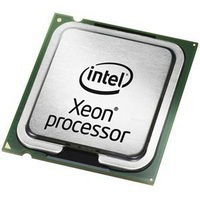Fujitsu Intel Xeon E5-2630 processor 2,3 GHz 15 MB L3

Intel Xeon E5-2630, 15M Cache, 2.30 GHz, 7.20 GT/s Intel QPI
Hyper-Threading Technology (HT Technology)
Today's Intel® Hyper-Threading Technology (Intel® HT Technology) delivers thread-level parallelism on each processor resulting in more efficient use of processor resources—higher processing throughput—and improved performance on the multi-threaded software of today and tomorrow.
Intel® Virtualization Technology (Intel® VT)
Increasing manageability, security, and flexibility in IT environments, virtualization technologies like hardware-assisted Intel® Virtualization Technology (Intel® VT) combined with software-based virtualization solutions provide maximum system utilization by consolidating multiple environments into a single server or PC. By abstracting the software away from the underlying hardware, a world of new usage models opens up that reduce costs, increase management efficiency, strengthen security, while making your computing infrastructure more resilient in the event of a disaster.
Intel® Virtualization Technology (Intel® VT) for Directed I/O (Intel® VT-d)
Intel® Virtualization Technology for Directed I/O (VT-d) extends Intel's Virtualization Technology (VT) roadmap by providing hardware assists for virtualization solution. VT-d continues from the existing support for IA-32 (VT-x) and Itanium® processor (VT-i) virtualization adding new support for I/O-device virtualization. Intel VT-d can help end users improve security and reliability of the systems and also improve performance of I/O devices in virtualized environment. These inherently helps IT managers reduce the overall total cost of ownership by reducing potential down time and increasing productive throughput by better utilization of the data center resources.
Intel® Trusted Execution Technology (Intel® TXT)
Intel® Trusted Execution Technology for safer computing is a versatile set of hardware extensions to Intel® processors and chipsets that enhance the digital office platform with security capabilities such as measured launch and protected execution. Intel Trusted Execution Technology provides hardware-based mechanisms that help protect against software-based attacks and protects the confidentiality and integrity of data stored or created on the client PC. It does this by enabling an environment where applications can run within their own space, protected from all other software on the system. These capabilities provide the protection mechanisms, rooted in hardware, that are necessary to provide trust in the application's execution environment. In turn, this can help to protect vital data and processes from being compromised by malicious software running on the platform.
Intel® 64 Architecture
Intel® 64 architecture delivers 64-bit computing on server, workstation, desktop and mobile platforms when combined with supporting software.¹ Intel 64 architecture improves performance by allowing systems to address more than 4 GB of both virtual and physical memory.
Enhanced Intel SpeedStep® Technology
Enhanced Intel SpeedStep® Technology is an advanced means of enabling very high performance while also meeting the power-conservation needs of mobile systems. Conventional Intel SpeedStep Technology switches both voltage and frequency in tandem between high and low levels in response to processor load.
Demand Based Switching (DBS)
DBS is a power-management technology developed by Intel, in which the applied voltage and clock speed of a microprocessor are kept at the minimum necessary levels for optimal performance of required operations. A microprocessor equipped with DBS operates at a reduced voltage and clock speed until more processing power is required. This is achieved by monitoring the processor’s use by application-level workloads, reducing the CPU speed when it is running idle while increasing it as the load increases. This technology was introduced as Intel SpeedStep® Technology in the server marketplace.
Intel® Flex Memory Technology
Facilitates easier upgrades by allowing different memory sizes to be populated and remain in dual-channel mode.
Execute Disable Bit
Execute Disable Bit is a hardware-based security feature that can reduce exposure to viruses and malicious-code attacks and prevent harmful software from executing and propagating on the server or network. Help protect your customers' business assets and reduce the need for costly virus-related repairs by building systems with built-in Intel Execute Disable Bit.
Fujitsu Intel Xeon E5-2630, Intel® Xeon® E5 Family, LGA 2011 (Socket R), 32 nm, E5-2630, 2,3 GHz, 64-bit
Fujitsu Intel Xeon E5-2630. Processor type: Intel® Xeon® E5 Family, Processor socket: LGA 2011 (Socket R), Processor lithography: 32 nm. Memory channels: Quad-channel, Maximum internal memory supported by processor: 750 GB, Memory clock speeds supported by processor: 800,1066,1333 MHz. Market segment: Server